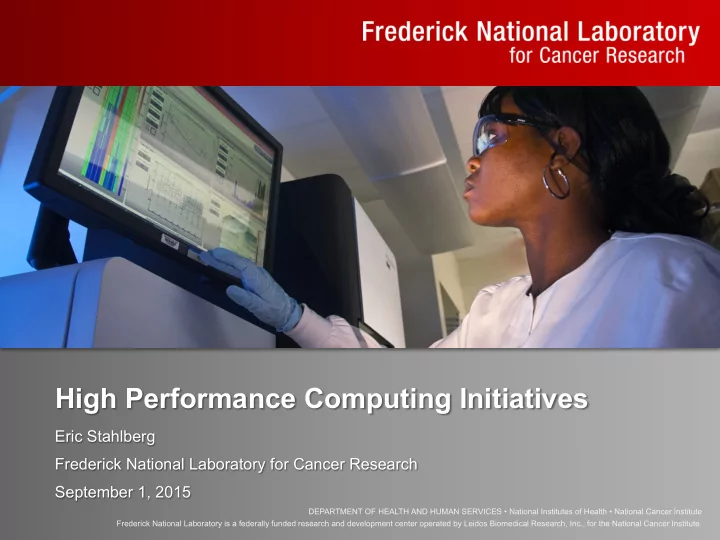

High Performance Computing Initiatives Eric Stahlberg Frederick National Laboratory for Cancer Research September 1, 2015 DEPARTMENT OF HEALTH AND HUMAN SERVICES • National Institutes of Health • National Cancer Institute Frederick National Laboratory is a federally funded research and development center operated by Leidos Biomedical Research, Inc., for the National Cancer Institute.
Background • Frederick National Laboratory for Cancer Research (FNLCR) – Only FFRDC dedicated to biomedical research – Operated by Leidos Biomedical Research Inc. – Base location in Frederick, Maryland – Brings public and private partners together to address the most difficult cancer research challenges • Impact – Develop faster and less expensive ways of turning laboratory discoveries into new diagnostic tests and treatments for cancer and AIDS • Scope – Basic research, translational research, technology development, and clinical/pre-clinical development
NCI CBIIT • NCI Center for Biomedical Informatics and Information Technology (CBIIT) – IT, scientific computing, informatics and technology supporting NCI mission – Under Office of the Director • NCI has 30 divisions, offices and centers – Intramural Research Program • Center for Cancer Research • Division of Cancer Epidemiology and Genetics – Extramural • Division of Cancer Biology, Division of Cancer Control and Populations Studies, Division of Cancer Prevention, Division of Cancer Treatment and Diagnosis, Division of Extramural Activities – Office of the Director – multiple centers
CBIIT and High Performance Computing • Motivations – Derive value from growing volumes, types and sources of data and information – Expanding support for growing data and computational science needs and opportunities – Essential to future mission success • Challenges – Limited resources – Limited expertise in new areas – Rapidly growing data requirements • Aims Support efforts to establish HPC foundations for predictive oncology and cancer precision medicine Frederick National Laboratory for Cancer Research
Expanding Role of HPC in Cancer Computational Science (~60%) • Molecular Dynamics Predictive • Computational Chemistry Modeling Data Transformation (~40%) and • Genomics Simulation • Image processing Data Science Transform • Analytics Analysis, and Search and Manage Compare Data (Estimated usage numbers for provided by Sean Davis, NCI Center for Cancer Research) Frederick National Laboratory for Cancer Research
HPC Enabling Precision Medicine Cancer Knowledge Predicted Cancer Outcome Patient Profile Precision Medicine Available Data Frederick National Laboratory for Cancer Research
HPC Resources at NCI Compute Cores (1K non-GPU cores) 800 700 600 500 400 300 200 100 0 NCI Advanced Biomedical NIH CIT/Biowulf US Department of Energy Computing Center Large scale production Extreme scale systems Application expertise Storage Network innovations Infrastructure innovations Data transfer $478M in FY14 to Novel algorithms Infrastructure Advanced Computing Research Frederick National Laboratory for Cancer Research
HPC Strategy Key Strategy Objectives • Enable research opportunities • Foster translation to clinical application • Accelerate cycle of discovery to delivery Extend Collaborate Enable Educate Prepare Frederick National Laboratory for Cancer Research
Exascale Cancer Science Exascale in a nutshell: • Millions of CPU cores contributing to a single task • Nearly 1000 times faster than fastest computer today • Focus of DOE Advanced Strategic Computing Exascale Cancer Science Collaborative Pilot Investigations Co-‑Design ¡ Efforts ¡ Applications: Development, Libraries, Frameworks Training: Scientists, Developers, Support Personnel Infrastructure: Networking, Data Transfer, Data Management, HPC Access 2015 ¡ 2016 ¡ 2017 ¡ 2018 ¡ 2019 ¡ 2020 ¡ Frederick National Laboratory for Cancer Research
National Strategic Computing Initiative • NSCI Executive Order announced July 29, 2015 • “Create a cohesive, multi-agency strategic vision and Federal investment strategy for HPC” • Lead agencies – DOE , DoD and NSF • Deployment agencies – NASA, NIH , DHS, and NOAA • Implications for NCI – Opportunities to work cross agency with DOE and others to expand use of HPC to advance research and clinical applications impacting cancer Frederick National Laboratory for Cancer Research
Upcoming Workshop • Computational Approaches for Cancer Workshop • When: Sunday, November 15, 2015 • Where: In conjunction with IEEE/ACM SC15 conference held in Austin, TX • Aims – Bring interdisciplinary community together – Learn about computing applications in cancer WORKSHOP – Look at challenges and find opportunities – Establish foundations for future workshop • More information: http://sc15compcancer.hpc.mssm.edu/ Frederick National Laboratory for Cancer Research
Summary • Enabling and Educating – NSF, DOE, Cloud resource access – Training and Workshops • Expanding – Biological Applications of Advanced Strategic Cancer Computing (BAASiC) Precision – Collaborations Medicine • Extending – National Strategic Computing Initiative • Aims • Enable research opportunities • Foster translation to clinical application • Accelerate cycle of discovery to delivery Frederick National Laboratory for Cancer Research
Recommend
More recommend